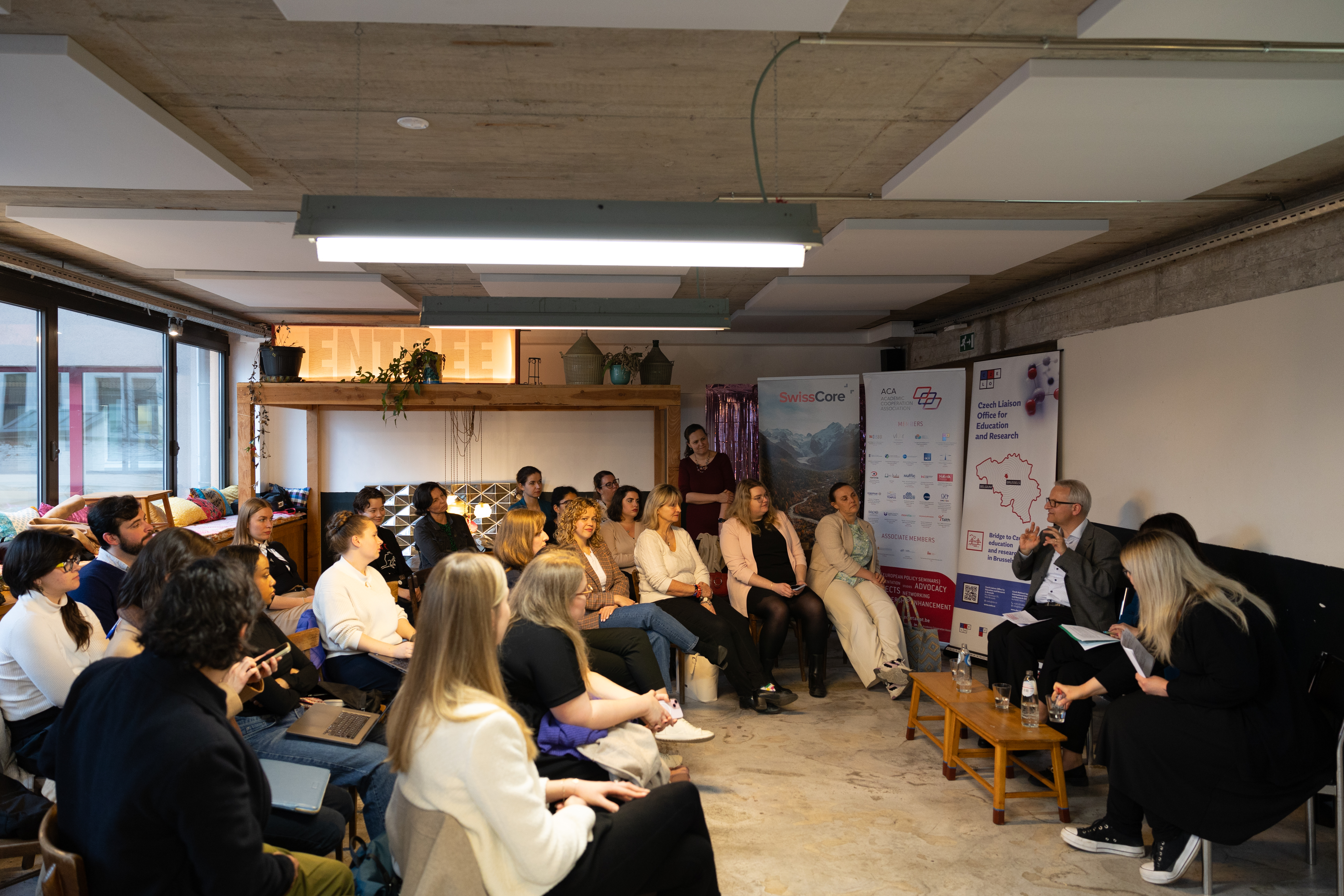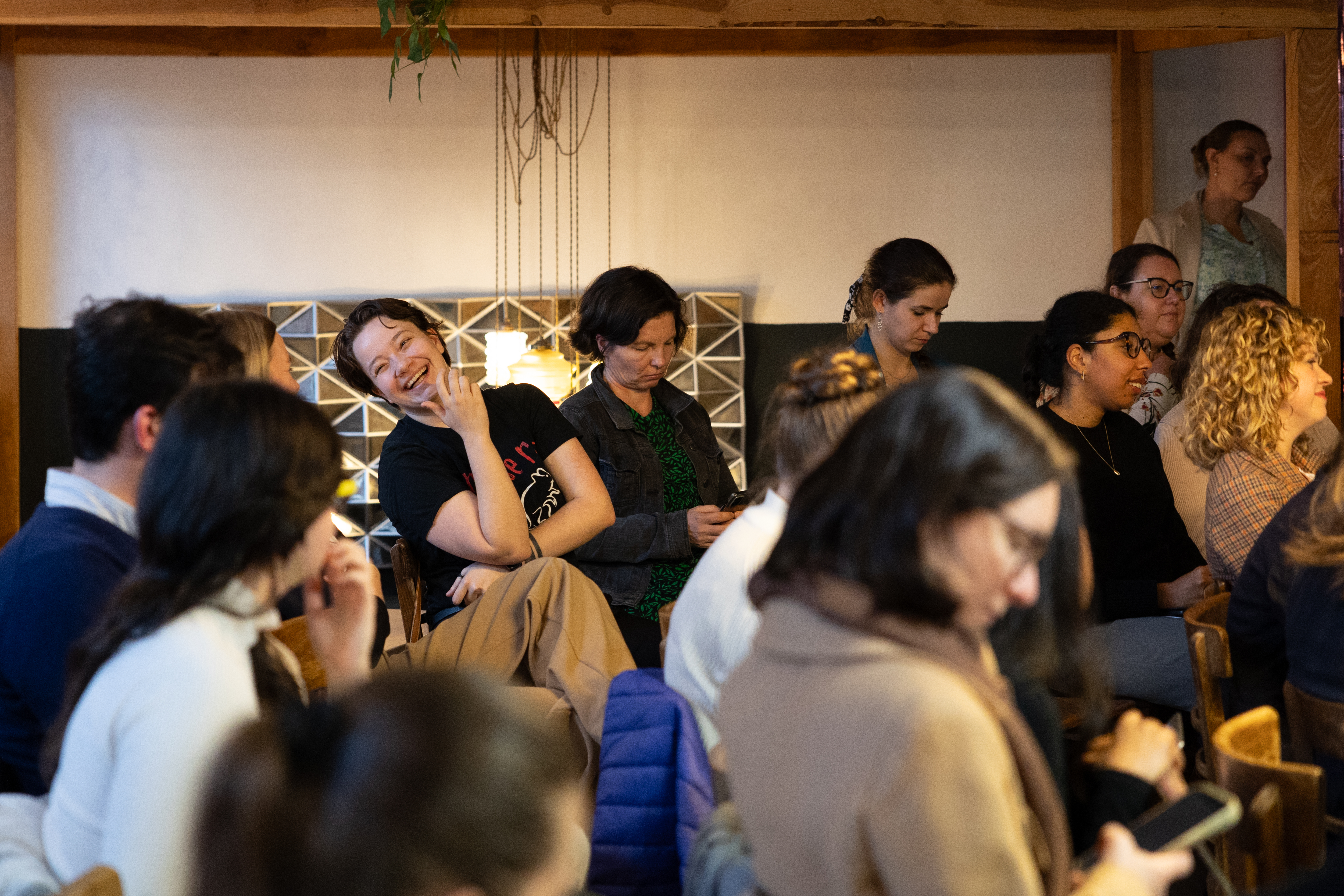AI in the classroom? March EduCafé sparked a discussion on challenges and opportunities
March EduCafé explored the pitfalls, challenges, and opportunities AI brings to the future of education.
On Wednesday, 26 March, we hosted the first EduCafé of the year in cooperation with the Academic Cooperation Association (ACA) and the Swiss Contact Office For Research And Higher Education (SwissCore). The event took place in the cosy atmosphere of Café Kamilou in the heart of Brussels’ European Quarter and brought together around 35 participants from both expert and general audiences. The debate featured Simona Petkova from the Unit C4 of European Commission’s Directorate-General for Education and Culture (DG EAC), and Edouard Lamboray from the Swiss organisation Educa. The discussion on fostering critical thinking in the age of AI was moderated by Angeliki Psychogyiou from ACA.
Artificial Intelligence in the Hands of a New Generation
At the start of the event, participants were invited to rate their level of trust in AI tools on a scale from 1 to 5. The overall consensus was that AI is useful and full of potential, but must be used thoughtfully and with caution. This view was echoed by both speakers in their opening remarks, where they emphasised the importance of critical engagement and careful consideration when integrating AI technologies into education.
The introduction also included a brief contribution, delivered by the moderator, from Associate Professor Tomáš Kroupa of the Czech Technical University’s Artificial Intelligence Centre. He raised the question of student motivation: Will AI remain attractive if it becomes a routine and mandatory part of education? He warned that while machines can personalise learning, they cannot replace human interaction, empathy, or inspiration. Referring to the experience of a teacher at a Prague primary school, he stressed that while AI can be a practical support tool, the role of the teacher remains irreplaceable. Kroupa also addressed the ethical dimension, stressing that AI must be understood not only as a technology but as a societal phenomenon with implications for our skills, behaviour, and human relationships.
Simona Petkova went on to explain that tools such as ChatGPT and Gemini are already used by more than half of young people (and not only them) for self-education. The youngest generations, she noted, are key drivers of change. They are the ones who understand and adapt to new technologies the fastest and actively shape their future use. Edouard Lamboray added that this privileged position should empower young people to explore the boundaries of AI, both in terms of its possibilities and, when guided properly, in terms of the responsibility it entails.

From Policy to Practice
The discussion also touched on relevant policy developments. Simona Petkova highlighted that digital skills are among the main priorities of the newly launched Union of Skills. One of its key aims is to strengthen the digital competencies of European citizens in a rapidly changing world. The plan underscores the importance of not only working with digital tools but also evaluating them critically and using them safely in various areas, from employability to civic participation. In the context of AI, digital literacy becomes not just a practical asset, but a vital foundation for active engagement in society. However, despite progress, disparities persist across countries; in some of them, digital competencies, including among the youngest generations, still fall short of what is needed.
AI: A Good Servant but a Bad Master
A particularly striking insight from the Swiss context came from Edouard Lamboray, who shared that up to a quarter of Swiss students and pupils reportedly turn to AI tools with personal issues, even considering them companions or friends of sorts. This kind of “boundary testing” underscores the need to educate students not only in how to use AI, but in understanding where its appropriate use ends, such as in the realm of psychological support.
While the personalisation of learning is a major benefit of AI integration, Lamboray also pointed to challenges, such as the need to process large volumes of personal data in order to tailor content to individual learners. This raises serious questions about data protection, algorithmic transparency, and accountability for AI-generated decisions in educational settings. Simona Petkova added that although AI tools can offer individualised learning, their accessibility is far from guaranteed. Many are paid, limited by language, or otherwise difficult to access, which are factors that deepen digital inequality among students.
Decentralisation as Both a Challenge and Opportunity
When asked about Switzerland’s approach to developing digital skills and introducing AI into education, Lamboray described the country’s decentralised education system, managed at the level of individual cantons. This setup requires intensive coordination between regions and careful definition of overarching principles to ensure that technology is integrated into schools evenly and meaningfully. He noted significant disparities in the size and resources of cantons, which affects the availability and quality of data essential for effective AI use. Smaller cantons often lack sufficient data, which complicates the implementation of AI-driven tools. Moreover, as AI evolves quickly, data that may have been applicable a year ago may already be outdated.

Simona Petkova also reflected on the downsides of decentralisation. In the field of education, the EU holds only a supporting competence, meaning it cannot directly intervene in member states’ education systems. While this allows national autonomy, it can also hinder coordinated action at the EU level on topics like digital skill development and AI integration, leading to uneven progress across Europe. One potential solution is supporting EdTech startups, which can offer innovative, flexible tools tailored to national contexts and help bridge gaps between systems. Another approach is fostering centrally managed projects under Erasmus+, such as the so-called Forward-Looking Projects.
The event concluded with audience questions, covering issues such as the role of parents and families in building digital literacy, and the potential use of AI in mental health support. After the formal discussion, participants had the opportunity to continue informal conversations over a glass of wine.